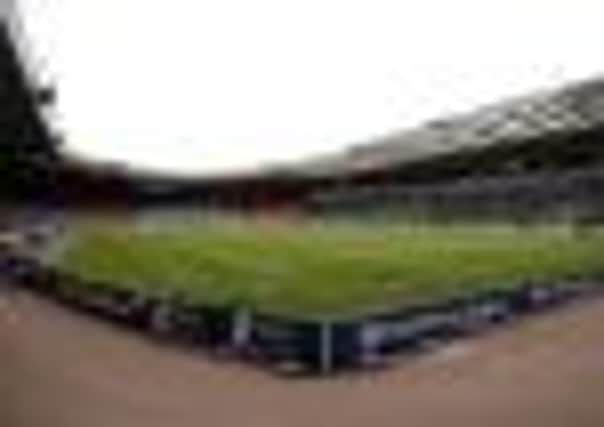Leaders: SFA must think again on best venue for capital cup final


SFA administrators argue that Hampden Park was the appropriate venue as it is the home of Scottish football and, it is understood, there are long-term legal agreements which tie semi-finals and finals to the national stadium.
On top of those arguments there is also a suspicion there is more to this decision – that there is a dislike, albeit unspoken, of the alternative venue for the game, Murrayfield stadium in Edinburgh, because it is the home of what is seen by some to be the more elitist game of rugby.
Advertisement
Hide AdAdvertisement
Hide AdNo-one seriously questions the place Hampden has in the life of Scottish football. Even after being rebuilt, it is steeped in the history of what is still our national game. It where the national team plays. Scottish football is administered from there.
Yet to immediately rule out the possibility of playing the game at Murrayfield, the alternative venue many fans support, is – as SNP deputy leader of Edinburgh city council Steve Cardownie rightly says – both predictable and short-sighted.
In contrast to the leader of his party, Alex Salmond – who typically could not resist intervening on the side of the SFA in an issue over which he has no locus – Mr Cardownie pointed out Murrayfield would house 15,000 more fans than Hampden’s 52,000 and be much more affordable for families.
To that we would add several more arguments. Having what would undoubtedly be a sold-out match at Murrayfield would create a much better atmosphere, not just because of a larger crowd, but also because of the better design of the stadium, which has steeper tiered seating than Hampden.
Staging the match in Edinburgh would not involve tens of thousands of fans travelling to Glasgow, with the problems on road and rail that would create, not to mention the vast carbon footprint the trip would leave behind in Mr Salmond’s environmentally conscious new Scotland.
Though it is to be hoped the event will be conducted in a spirit of rivalry, the police will have to plan for possible clashes between fans, and while that could be a problem in both venues, it might be best addressed in the clubs’ home city. The football authorities should listen to these powerful arguments.
According the SFA’s own mission statement it exists “to promote, foster and develop the game at all levels” in Scotland. What could be better for promoting, fostering and developing football than a hard-fought cup final in front of 67,000 passionate supporters in a cauldron-like atmosphere of Murrayfield? Nothing. Time for the SFA to think again.
Lib Dems have no laurels to rest on
There is none so optimistic as the politician on the hunt for votes. One of the ways those seeking office, or promoting their party, keep going through the slog of elections is to convince themselves they are on a roll, that victory is in sight, that things are going their way.
Advertisement
Hide AdAdvertisement
Hide AdThat is the context in which we must view the confident prediction by Willie Rennie, the leader of the Scottish Liberal Democrats, that the mood among voters has changed in relation to his party, which suffered heavily at the last Holyrood election due to its Westminster coalition deal with the Conservatives.
According to Mr Rennie, Scots have not forgotten the coalition deal – in which his party reneged on key election pledges such as its opposition to university tuition fees – but are now ready to listen again as the Lib Dems campaign for May’s council elections.
Since taking over from Tavish Scott as the leader of the greatly reduced group of five Lib Dem MSPs, Mr Rennie has made an impact, ensuring his party punches above its Holyrood weight, but he deludes himself if he thinks it has been forgiven for the actions of his Westminster colleagues.
Mr Rennie also argued that Lib Dems in local government have a good record, a statement which will produce incredulous derision among electors in Edinburgh, for example, where the party has presided over the continuing trams fiasco and failed to provide leadership at a time of economic crisis.
The Lib Dems, with their Liberal Party roots, have a long and proud history in Scottish politics, but they need to learn it take more than optimism to win elections.
We really are a mongrel nation
At THE height of the agitation for home rule in the 1990s, novelist William McIlvanney described Scotland as “a mongrel nation”, making the point that Scots were ethnically diverse and their claim for self-government was based not on race, but identity.
Little did the great man know just how prescient his observation was. We are, it turns out, an extremely mongrel nation. According to Edinburgh University researchers, there is an extraordinary and unexpected diversity in our national DNA.
We are made up of nearly 100 groups of male ancestry and more than 150 female groups, from Europe and beyond. More than 1 per cent of all Scotsmen are direct descendants of Saharan nomads. Others’ ancestors were from a lost tribe who fought the Romans.
Advertisement
Hide AdAdvertisement
Hide AdWhat to make of this? Critics of the Scots might say we sometimes act like tribesmen, particularly in matters of sport. Others that our mixed up DNA should be celebrated: we’re mongrels and we’re proud of it.
News that 15 per cent of Stewarts have royal blood may give some a feeling of superiority, tempered only by results which suggest they originate from Cornwall. One thing is for sure though, Jock Tamson’s bairns we are not.